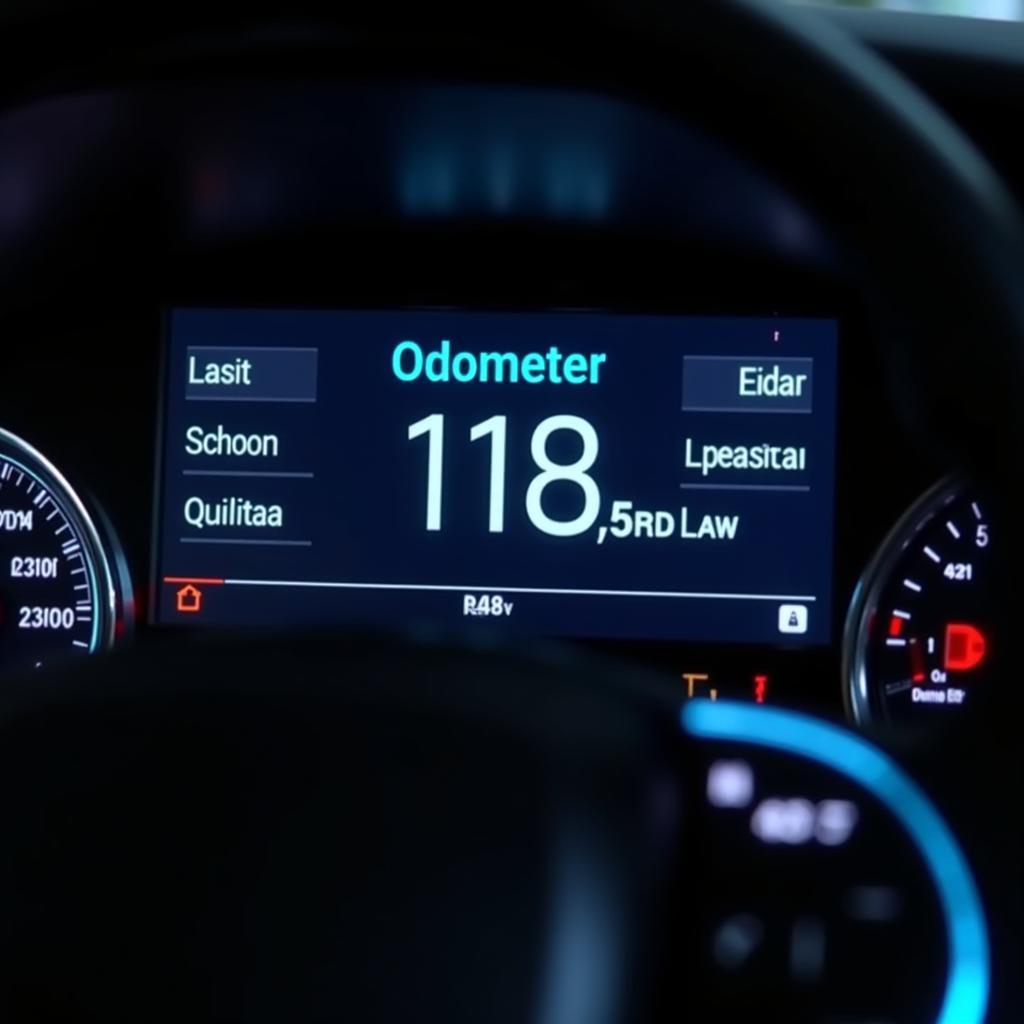Tampering with a car’s odometer, essentially changing the mileage displayed, is a serious issue. It’s illegal in most places and can have significant financial repercussions for unsuspecting buyers. But is it possible? Unfortunately, yes. This article dives into the methods used to alter odometer readings, the consequences of such actions, and how to protect yourself from odometer fraud.
How is Odometer Rollback Possible?
Historically, odometers were mechanical, making it relatively easy to roll back the mileage. With a simple twist of a screwdriver, a car’s apparent mileage could be drastically reduced, making it seem newer and more valuable. While digital odometers are now the standard, they aren’t foolproof. Sophisticated tools and software allow unscrupulous individuals to manipulate the electronic systems controlling the mileage display. This can be done through the OBD-II port, directly accessing the instrument cluster, or even by replacing the entire unit.
The motivation behind odometer rollback is primarily financial. A car with lower mileage typically commands a higher price. This creates a strong incentive for dishonest sellers to tamper with the odometer, potentially defrauding buyers out of thousands of dollars.
Beyond the immediate financial implications, odometer fraud has broader consequences. It disrupts the used car market, erodes trust between buyers and sellers, and can lead to safety concerns. A car with a falsely low mileage might have missed crucial maintenance, putting the driver at risk.
Detecting Odometer Fraud: What to Look For
While sophisticated methods exist to alter odometer readings, there are still telltale signs that can help you spot potential fraud. Look for inconsistencies in the vehicle’s documentation, such as service records that don’t match the reported mileage. Physical wear and tear on the car, like worn pedals, steering wheel, or seats, can also be indicators that the mileage is higher than displayed.
Additionally, online resources like carfax.com used cars can provide valuable information about a vehicle’s history, including reported mileage at different points in time. Discrepancies in these reports can be a red flag. Professional pre-purchase inspections, especially by a mechanic specializing in diagnostics, can also reveal inconsistencies and potential signs of odometer tampering.
What are the Legal Ramifications of Odometer Tampering?
Tampering with a car’s odometer is a federal offense in many countries. Penalties can include hefty fines and even imprisonment. Furthermore, victims of odometer fraud can pursue legal action against the seller, seeking compensation for the financial losses incurred.
Can I Reset My Odometer?
Resetting an odometer is a different concept from rolling it back. While resetting usually implies returning the odometer to zero after a repair or replacement, rolling back implies fraudulently reducing the mileage. Resetting is legal in specific situations, such as after replacing a faulty instrument cluster. However, it’s crucial to document the process and inform potential buyers about the reset.
 Digital Odometer Display
Digital Odometer Display
Protecting Yourself From Odometer Fraud: Essential Tips
Protecting yourself from odometer fraud requires vigilance and a proactive approach. Thoroughly inspect the vehicle for signs of wear and tear, request all maintenance records, and use online resources like how do i get my new car totle and vehicle history reports. Consider a professional pre-purchase inspection, especially if you suspect something is amiss.
Conclusion
While the question “can one change the odometer reading of a car?” has an unfortunate “yes” as the answer, being aware of the methods used and the signs to look for can significantly reduce your risk of becoming a victim of odometer fraud. Be proactive, do your research, and protect yourself from this costly deception.
FAQ
-
What is odometer fraud?
Odometer fraud is the illegal practice of changing a vehicle’s mileage to make it appear newer and more valuable. -
How can I tell if an odometer has been rolled back?
Look for inconsistencies in service records, physical wear and tear, and check vehicle history reports. -
Is it legal to reset an odometer?
Resetting is legal under specific circumstances, like after a repair, but must be documented. -
What are the penalties for odometer tampering?
Penalties can include significant fines and even jail time. -
How can I protect myself from odometer fraud?
Be diligent, research the vehicle’s history, inspect it thoroughly, and consider a pre-purchase inspection. -
Where can I get a vehicle history report?
Websites like Carfax and AutoCheck offer detailed vehicle history reports. -
What should I do if I suspect odometer fraud?
Report your suspicions to the appropriate authorities and seek legal counsel if necessary.
Do you have any other questions related to dealer scanners or diagnosing car issues? Check out our other helpful articles on DiagXcar. We cover a wide range of topics, from understanding diagnostic trouble codes to choosing the right scanner for your needs.
When you need assistance, don’t hesitate to contact us via WhatsApp: +1(641)206-8880, Email: [email protected] or visit us at 276 Reock St, City of Orange, NJ 07050, United States. We have a 24/7 customer support team ready to help.


